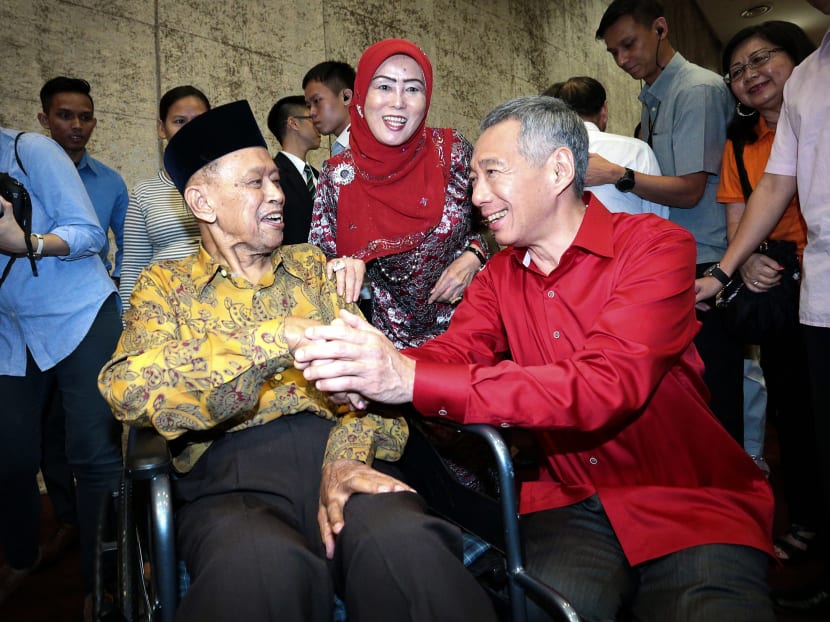Othman Wok’s bedrock belief: A multi-racial Singapore
SINGAPORE — For Mr Othman Wok, being a Malay leader from the ruling People’s Action Party (PAP) during the turbulent 1960s was no walk in the park — he even had to deal with accusations that he was a traitor to his own race.

PM Lee Hsien Loong with Othman Wok at the National Day Rally on August 23, 2015. Photo: Jason Quah/TODAY
SINGAPORE — For Mr Othman Wok, being a Malay leader from the ruling People’s Action Party (PAP) during the turbulent 1960s was no walk in the park — he even had to deal with accusations that he was a traitor to his own race.
With the PAP regarded then as a largely Chinese party with little interest in Malay affairs, and the United Malays National Organisation (Umno) having a strong influence on the island, it was not easy for Mr Othman and his Malay colleagues in the party to convince their community that the PAP would look after their interests, especially after Singapore separated from Malaysia in 1965.
Undaunted, Mr Othman, who was Social Affairs Minister from 1963 to 1977, introduced several initiatives to ensure the welfare of the Malay community.
These included providing all Malays with free education from primary to tertiary level, viewed then as the best way to advance the community; and the setting up of the Mosque Building Fund (MBF), with Muslims contributing a small sum from their monthly salary to build mosques in their housing estates.
For Mr Othman, the racial tensions that erupted a year after Singapore joined Malaysia only served to strengthen his belief that the PAP’s multi-racial policy was crucial to the island’s future.
On July 21, 1964, tensions between the Malay and Chinese communities — stoked by fiery speeches by extremist Umno leaders from Kuala Lumpur — came to a head during a procession to celebrate Prophet Muhammad’s birthday in Singapore.
Mr Othman — who as Social Affairs Minister had led a contingent of Malay/Muslim PAP members at the procession — had a ringside view of the trouble that followed.
In an interview with Channel NewsAsia in 2007, he said: “I was very sad ... This was a racial riot between the communities, the Chinese and the Malays. And before that, they were very friendly.” In the aftermath of the riots, it was clear that strenuous efforts would be needed to rebuild relationships between the races.
“So we (the Government) decided, after the riots, that this should not go on, polarisation between the two communities — have to let them live together. At that time, we (were) building flats, so we moved them, mixed together. It was not an easy thing to do but eventually they began to learn how to live as good neighbours,” he recalled.
At the height of the 1964 tensions, Mr Othman also found himself becoming the principal target of verbal abuse among some segments of the Malay/Muslim community.
He was labelled an infidel — the worst insult for a member of the community. But such attacks did not break his spirit.
In a tribute to Mr Othman in 1998, Singapore’s first prime minister, the late Mr Lee Kuan Yew, said: “I remembered your staunch loyalty during those troubled days when you were in Malaysia, and the tensions were most severe, immediately before and following the bloody riots in July 1964.
“At that time, the greatest pressures were mounted by Umno Malay extremists who denounced you and Malay PAP leaders — especially you — as infidels (kafir) and traitors (pengkhianat), not to Singapore but to the Malay race.
“I heard it, the crowds said it, bunches of them. They were designed to intimidate him and the other Malay leaders in PAP. Because of the courage and the leadership you showed, not one Malay PAP leader wavered and that made a difference to Singapore.”
As the only Malay minister in the Cabinet then, Mr Othman was among the leaders who had signed the Independence of Singapore Agreement on Aug 7, 1965 to separate from Malaysia.
Recalling the day’s events in his biography, Mr Othman wrote that he drove Mr S Rajaratnam to Kuala Lumper to meet Mr Lee, Mr Toh Chin Chye and other members of the Cabinet.
The late Mr Lee had called him into the next room and asked if he would sign the Separation Agreement. He said he would, but also asked what would happen to the communists in Singapore. Mr Lee told him not to worry because he would handle them.
The separation was a relief to Mr Othman: “Separation to me meant less pressure. As a Malay PAP minister, I had been in a difficult position. With the separation, I thought that it would be much easier for me and everyone else to get on with the job.”
As the minister overseeing the Malay-Muslim community, Mr Othman also introduced initiatives that continue to serve the community well today.
Apart from the MBF, he also helped to establish the Islamic Religious Council of Singapore (Muis), which sees to the welfare of Muslims here, and to introduce regulations on activities related to the Haj pilgrimage.
In an interview with The Straits Times in 2009, Mr Othman noted that the Malays had come a long way since the nation’s independence.
“Even without special rights, Malays in Singapore are doing very well now. They can stand on their own two feet and compete with others,” he said.






